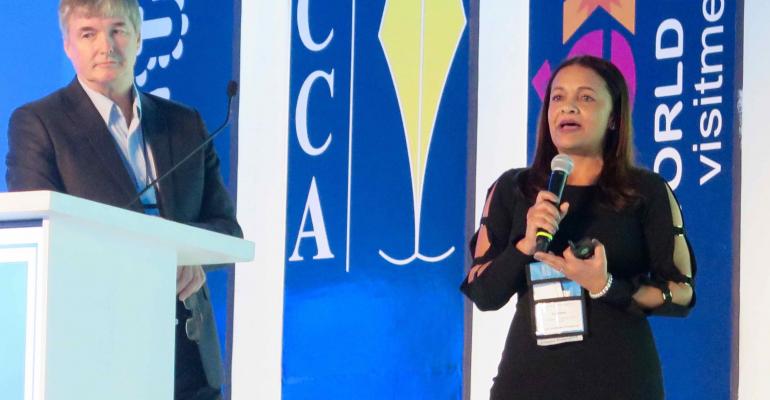Coffee is an example of the complexity.
Café Azul is one of Mexico's leading coffee producers, but it doesn't sell coffee to the cruise lines. González explained that Café Azul can't meet the prices needed for the free coffee served on board and, when it comes to coffee that's sold, non-Mexican passengers aren't familiar with the brand.
'Coffee is a very, very difficult commodity' because lines carry international passengers, said Vina Adams, senior manager, procurement, food & beverage, Royal Caribbean Cruises Ltd. 'The most complaints we get are about coffee and pizza.'
Adams had to go to school to learn about coffee, and discovered it's not just the product but how long it's brewed and when it's served.
Because of international clientele, brand preferences vary. Americans know Seattle's Best or Starbucks, while Italians favor Segafredo, illy or Lavazza.
At the FCCA conference in Mérida, Mexico, González noted Mexico accounts for about 28% of cruising's global passenger volume, but only about $600m of the industry's $40bn in purchases. His company provides logistics services.
Lines tend to supply their ships by containers, not locally, and due to costs and regulatory complexities, Chilean fruits exported to Florida, for example, are purchased by cruise lines and may go back by container to supply ships sailing in Chile, González said.
However, he pointed out it's not necessary for Mexico to sell domestic products to benefit from the cruise business.
'If we put Chilean wines into the ships in Mexico, we activate the value chain,' he said. It's the same with Coca-Cola.
Quality, innovation, cost and service are key to supplying the cruise industry, according to Paolo Raia, VP global strategic sourcing, food & beverage, Carnival Corp. & plc. His department is organized into four geographic areas: the US/Caribbean, Europe, Asia and Australia. Ninety percent of the food purchases for ships are made within the region where they operate.
Until two years ago, Carnival Corp. brands made autonomous purchasing decisions and each had its own supply chain. The goal now is to harmonize specifications and leverage the company's scale. Each line's corporate chefs still choose the products, but merely by harmonizing specifications, costs go down, Raia said.
Carnival's global sourcing approach can benefit suppliers, too, since they don't have to interact with multiple brands. And the goal is to reduce the number of suppliers so Carnival can be a strategic partner for suppliers who'll do a higher volume of business.
'This doesn't mean small suppliers can't work with us,' Raia told the FCCA audience. They need to work with a consolidator, which may be delivering thousands of items, to create volume. When Carnival finds a new product it likes, it can connect the supplier to 'plug in' with a network—companies like Café Azul and Gordon Food Service.
Family-owned Gordon Food Service works with all the major lines and distributes in 40 countries, with more than 66,000 employees in 125 nations. The company loads and exports multiple container orders daily. It also cubes out and maximizes all containers for the customer, having on hand five agreed items that are used weekly such as toilet paper or water.
'Even huge companies need consolidators like us,' said John Helverson, manager, international sales.
Reducing the number of suppliers doesn't mean Carnival isn't looking for new ones, Raia added. Innovation is a priority, he said; Carnival wants to bring in new suppliers and products.
A food service industry veteran who joined the cruise business one year ago, Colista James, senior director, food & beverage supply chain management and brand protection, Norwegian Cruise Line Holdings, said the complex logistics set cruising apart.
Suppliers have to deliver the full amount of product and be sure it gets to the ships in time. Volume and consistency are very important. Food safety and quality, too.
'Brand protection' ensures suppliers meet brand standards for traceability, sanitation and other factors, subject to third party audit.
'Can we work together to establish cruise industry standards?' James proposed. 'Food safety is not a competitive advantage.'
NCLH divides purchasing into categories like protein, groceries and produce. Different categories have different contract times. For example, James noted the the dry grocery contract starts Oct. 1; it's not possible to come in at another time.
To get a foot in the door, suppliers need to interest the culinary team. A supplier at the FCCA conference asked about cruise lines' interest in products that meet the 'flexitarian' diet, one that is plant-based but occasionally includes meat.
'We get a lot of requests for plant-based or vegetarian options,' James said. And Raia suggested targeting even one innovative chef in the fleet by demonstrating new products and cooking methods could be a way to get selected.
Is there interest in artisanal products? Yes. They generate a story line for customers.
FCCA purchasing committee chairman Mike Jones, SVP supply chain, travel, port services & workplace solutions, Royal Caribbean Cruises Ltd., advised suppliers to study where the ships turn and the demographics of the passengers, which drive the demand for the products used.
'We are diversifying our suppliers significantly based on where the ships are going,' Jones said. In recent years, due to globalization of the business, Royal Caribbean is purchasing much more locally, though containers still carry the bulk of provisions.
A Dominican Republic representative who said his government would like to invite cruise lines to visit and learn about products the country can supply got a positive response from the panel.
Raia suggested inviting a group of lines to go together, and James—who recently took such a trip to Costa Rica and said NCLH is testing a product on board as a result—called it a great idea.
'Include the chef,' she urged. 'They are the ones making the decisions' about new products.
Copyright © 2024. All rights reserved. Seatrade, a trading name of Informa Markets (UK) Limited. Add Seatrade Cruise News to your Google News feed.


